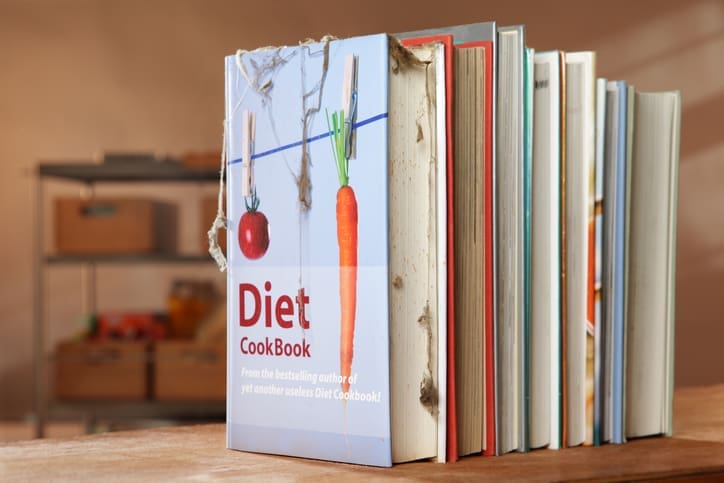November 5, 2025
Why Most Diets Don’t Work – Especially During Menopause!
It’s November, the nights are drawing in, and the festive season is just around the corner. Everywhere you look, diet ads are already popping up, promising rapid weight loss, detoxes, and “miracle” fixes. It can feel like you need to start restricting calories yesterday, just to stay ahead of the holiday indulgence.

But if you’re in perimenopause or menopause, here’s the frustrating truth: the diets that worked for you in the past often stop working now. You may have tried low-calorie plans, juice cleanses, intermittent fasting, or elimination diets, only to feel defeated when the results don’t stick. And the reality is, it’s not your fault. Your body is simply playing by a new set of rules, and understanding them is the first step toward sustainable, kind, and effective health habits.
As a menopause health coach, I see this pattern over and over: women following every “by the book” diet, only to feel defeated when results don’t appear. The good news? You don’t have to join the fray of seasonal diet hype. There’s a wiser, calmer way to approach this, one that works with your body, not against it.
How Your Body Changes During Menopause (Hormones, Muscle, and Metabolism)
Here are the biological truths nobody told you when you were younger:
- Hormones shift: As you approach and enter menopause, oestrogen (and other hormones) decline. This changes how your body stores fat, responds to food, and reacts to exercise.
- Muscle mass declines: Less muscle = lower resting metabolism = fewer calories needed to maintain the same weight.
- Insulin sensitivity shifts: Your body may handle carbs and calories differently than before.
- Fat distribution changes: More fat may accumulate around your middle (hello “menobelly”) than on your hips/thighs as it did in your 30s.
- Sleep & mood disruptions: Night sweats, hot flashes, insomnia, and mood swings impact appetite, cravings, and weight regulation.
FACTS (British Menopause Society & SWAN study):
- Weight gain affects at least 50% of women during perimenopause and menopause.
- On average, women gain around 1.5kg per year during this transition, often accumulating fat around the abdomen and upper body.
- Metabolic rate slows as lean muscle mass reduces, while visceral fat rises from 5–8% to 10–15% of total body weight.
Why Most Diets Fail—Especially During Menopause

Most diets fail for everyone—but the problem is even bigger during midlife and menopause. Here’s why:
- Calorie restriction backfires: Cutting calories or entire food groups can trigger muscle loss, slow metabolism, and leave you drained.
- Hormonal hunger signals are ignored: Cravings, appetite changes, and night-time hunger are natural during menopause.
- Short-term thinking: Quick-fix diets don’t match the longer-term approach needed for midlife health.
- Nutrient needs shift: You need more protein, healthy fats, and micronutrients to maintain muscle, hormones, and metabolism.
Other Factors That Cause Weight Gain in Menopause
Weight gain isn’t just about diet. Consider these hidden contributors:
- Reduced activity: Joint pain, fatigue, or busy schedules can lower calorie burn and muscle maintenance.
- Poor sleep: Night sweats and insomnia disrupt hormones like cortisol, ghrelin, and leptin.
- Stress: Chronic stress increases cortisol, encouraging belly fat.
- Ageing: Your baseline calorie needs naturally decline over time.
- Diet quality: Processed foods, refined carbs, and added sugars behave differently in a midlife body.
Practical Solutions That Make a Difference
These are sustainable, realistic strategies, no waiting for January needed:
- Shift your goal from “lose kilos” to “build habits that support my changing body” – Focus on strength, energy, mood, and body composition rather than just the scale.
- Prioritise strength training & muscle preservation – 2–3 sessions per week of resistance work (weights, bands, bodyweight). Even gentle, consistent strength training preserves muscle and metabolism.
- Focus on protein + fibre + healthy fats. Protein maintains muscle, fibre supports gut and hormone health, healthy fats aid hormone production. Example: protein-rich breakfast, veggies, legumes/fish/nuts throughout the day.
- Improve sleep & manage stress. Establish wind-down routines, consistent sleep schedules, and strategies for night sweats. Sleep disruption affects metabolism, appetite, and cravings.
- Adjust energy balance intelligently. Your calorie needs may have decreased, but don’t slash calories aggressively. Reduce processed carbs, avoid excessive liquid calories, monitor alcohol — all without extreme restriction.
- Adopt a “nourish & support” mindset, not “punish & restrict” – Ask: “What can I add — nutritious foods, fun movement, better sleep?” rather than “What must I cut?” This approach is sustainable, gentle, and effective. Menopausal bodies thrive on care, not deprivation.
Be patient & kind to yourself – Celebrate small wins: feeling stronger, more energy, better sleep, or clothes fitting comfortably. Remember: it’s not just about fitting into your old jeans; it’s about supporting your health, vitality, and longevity.

Navigate Midlife with Confidence Through Menopause
Many women feel like they’ve lost their “body self” in midlife. They hop from diet to diet, ending up frustrated and defeated. I get asked a lot “Can you do anything about the menopause weight gain?” The answer is Yes! You don’t have to do this alone, I am here to help:
As a qualified nutritionist & health coach I can provide:
- Tailored support: Personalised plans based on your lifestyle, hormones, and goals.
- Behavioural change guidance: Mindset, habits, and lifestyle strategies for long-term success.
- Accountability & motivation: Support to stay committed and consistent.
- Holistic approach: Nutrition, exercise, stress, and sleep all considered.
- Improved outcomes: Research shows health coaching improves sustainable weight management. In a small trial, adults who received bi-weekly 1:1 health coaching lost over six times more weight than those without coaching, highlighting the power of personalized support for lasting results (1)
With the right support, you can build sustainable habits, feel stronger, and manage weight healthily.
Key Takeaways
- Diets that might have worked in your 20s or 30s may no longer be effective, your body’s rules have changed.
- Menopause doesn’t automatically mean wild weight gain, but fat distribution, metabolism, and hormones shift.
- Restrictive diets often fail midlife; sustainable habits work better.
- Focus on strength training, protein, nutrient quality, sleep, stress management, and nourishment.
- Be kind to yourself. This is about supporting your body for health, energy, and longevity, not punishing it.
Sustainable Health Support for Women in Peri‑ and Menopause
- Click Here to Book a FREE 15-minute call to explore how a 12-week personalised menopause coaching plan could help you create lasting, sustainable results
- Menobelly Supplement isn’t a quick fix or diet. It’s designed to support your body during menopause, helping to reduce cortisol, ease bloating, and complement healthy habits on your weight management journey — supporting not just your waistline, but your overall health and vitality. Click here to find out more.
Reference